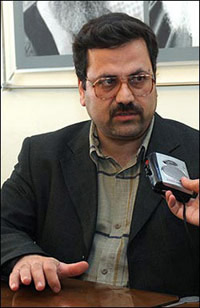Rationalization of Oral History Books (part II)
Rationalization Represents the Mastery of Compiler over Text
Akram Dashtban
Translated by: Fazel Shirzad
2018-5-29
Note: Following report is based on an invitation in which history experts are asked questions about oral history. In this regard, one of experts, as his perspective, has answered to one of questions titled "The amount of rationalization and appendix in oral history books". We'll read these comments as follows.
Mohammad Javad Moradinia, general director of Office for the Development of Books and Reading Books of the Ministry of Culture and Islamic Guidance and the director of Oral History Two-Quarterly, commented oral history site of Iran about rationalization of oral history's texts.

He spoke about the amount of rationalization and appendix in oral history books: As title showed, rationalization is an introduction of names, places, historical phenomena, the name of book, and so on, which is ambiguous to addressee, and compiler bring explanation, based on valid documentation and references, in the footnotes of book.
Moradinia continues to state that there is no different between definition of rationalization in oral memory and oral history, and added: Although this two formats are distinct in definition, author uses the technique of rationalization in the compilation of work when s/he encounter with ambiguous and unknown terms.
Saying about functions of rationalization, he added: The rationalization of text shows that the compiler of book has mastered on it and has worked hard to make the text a useful and effective one. Otherwise, it eliminates the ambiguities of text and converts a work from an early to polished one, and becomes closer to a research work.
The director of Oral History Two-Quarterly said about weak points that threatens rationalization of oral history: If a text selected for rationalization is not documented or ambiguous, it will add disadvantages to book. It is not supposed to make topics more obscure by rationalization in book. If compiler has encountered with a name in narration and cannot explain it well or does not have a reliable explanation for information which he provided, s/he only adds to shortcomings of effect.
The proper extraction of content is related to interviewer, if interviewer submits subject in ambiguous or summary terms, this is the art of interviewer to keep interview climate, hold the dialogue, then ask questions and take answers and rationalized text. It is not necessarily supposed that rationalization and explanations are brought in the text only compiler.
Moradinia explained about the amount of rationalization: The amount of rationalization should be concise and useful and should not overcome the text; a line, for example, should not be explained in twenty lines. This is the art of author and compiler to state readers, what they intended, with minimal words and sentences and does not exceed its limits.
Iranian oral history website asks question to experts about oral history, and publish responses to readers. Total responses will have remarkable results. If you have any questions, please feel free to submit it via this page to read comments from experts of oral history!
Number of Visits: 4749








The latest
- The Embankment Wounded Shoulders – 9
- Spraying Poison in Prison
- Operation Beit al-Moqaddas and Liberation of Khorramshahr
- The 367 Night of Memory – 2
- Memoirs of Ali-Asghar Khani, Commander of the Karbala Battalion in the Ali ibn Abi Talib Division
- The Embankment Wounded Shoulders – 8
- Unveiling of the book "Qasem" narrated by Morteza Sarhangi
- The Study Journey of Hypocrites
Most visited
- Memoirs of Hujjat al-Islam Reza Motalebi
- The Study Journey of Hypocrites
- The Necessity of Receiving Feedback in Oral History
- Unveiling of the book "Qasem" narrated by Morteza Sarhangi
- The Embankment Wounded Shoulders – 8
- Memoirs of Ali-Asghar Khani, Commander of the Karbala Battalion in the Ali ibn Abi Talib Division
- The 367 Night of Memory – 2
- Operation Beit al-Moqaddas and Liberation of Khorramshahr
Morteza Tavakoli Narrates Student Activities
I am from Isfahan, born in 1336 (1957). I entered Mashhad University with a bag of fiery feelings and a desire for rights and freedom. Less than three months into the academic year, I was arrested in Azar 1355 (November 1976), or perhaps in 1354 (1975). I was detained for about 35 days. The reason for my arrest was that we gathered like-minded students in the Faculty of Literature on 16th of Azar ...A narration from the event of 17th of Shahrivar
Early on the morning of Friday, 17th of Shahrivar 1357 (September 17, 1978), I found myself in an area I was familiar with, unaware of the gathering that would form there and the intense reaction it would provoke. I had anticipated a march similar to previous days, so I ventured onto the street with a tape recorder I had brought back from my recent trip abroad.A Review of the Book “Brothers of the Castle of the Forgetful”: Memoirs of Taher Asadollahi
"In the morning, a white-haired, thin captain who looked to be twenty-five or six years old came after counting and having breakfast, walked in front of everyone, holding his waist, and said, "From tomorrow on, when you sit down and get up, you will say, 'Death to Khomeini,' otherwise I will bring disaster upon you, so that you will wish for death."Tabas Fog
Ebham-e Tabas: Ramzgoshayi az ja’beh siah-e tahajom nezami Amrika (Tabas Fog: Decoding the Black Box of the U.S. Military Invasion) is the title of a recently published book by Shadab Asgari. After the Islamic Revolution, on November 4, 1979, students seized the US embassy in Tehran and a number of US diplomats were imprisoned. The US army carried out “Tabas Operation” or “Eagle’s Claw” in Iran on April 24, 1980, ostensibly to free these diplomats, but it failed.

